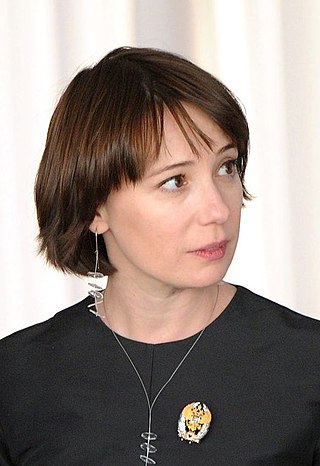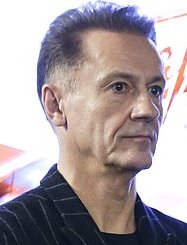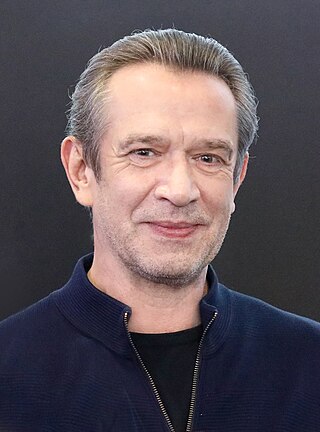
Vladimir Voronin is a Moldovan politician. He was the third President of Moldova from 2001 until 2009 and has been the leader of the Party of Communists of Moldova (PCRM) since 1994. He was Europe's first democratically elected communist party head of state after the dissolution of the Eastern Bloc.
Memorial is an international human rights organisation, founded in Russia during the fall of the Soviet Union to study and examine the human rights violations and other crimes committed under Joseph Stalin's reign. Subsequently, it expanded the scope of its research to cover the entire Soviet period. Memorial is the recipient of numerous awards, among others the Nobel Peace Prize in 2022.

Lyudmila Aleksandrovna Ocheretnaya is a Russian linguist who served as the First Lady of Russia from 2000 to 2008 and from 2012 to 2014 while married to her then-husband, the current president and former prime minister of Russia.
Soviet nonconformist art was Soviet art produced in the former Soviet Union outside the control of the Soviet state started in the Stalinist era, in particular, outside of the rubric of Socialist Realism. Other terms used to refer to this phenomenon are Soviet counterculture, "underground art" or "unofficial art".

Chulpan Nailevna Khamatova is a Russian actress.

Oleg Pavlovich Tabakov was a Soviet and Russian actor and the Artistic Director of the Moscow Art Theatre. People's Artist of the USSR (1988).

Oleg Evgenyevich Menshikov, PAR is a Russian actor, theatre director and occasional singer. He is the current artistic director of the Yermolova Theatre in Moscow.

The Security Council of the Russian Federation is a constitutional consultative body of the Russian president that supports the president's decision-making on national security affairs and matters of strategic interest. Composed of Russia's top state officials and heads of defence and security agencies and chaired by the president of Russia, the SCRF acts as a forum for coordinating and integrating national security policy.

Playing the Victim is a Russian 2006 black comedy film.
Terrorism in Russia has a long history starting from the time of the Russian Empire. Terrorism, in the modern sense, means violence against civilians to achieve political or ideological objectives by creating extreme fear.

The Great Russian Encyclopedia is a universal Russian encyclopedia, completed in 36 volumes, published between 2004 and 2017 by Great Russian Encyclopedia, JSC. A successor to the Great Soviet Encyclopedia, it was released under the auspices of the Russian Academy of Sciences (RAS) after President Vladimir Putin signed a presidential decree №1156 in 2002. The complete edition was released by 2017.
Vladimir Valerianovich Pribylovsky was a Soviet and Russian political scientist, historian, journalist, human rights activist, and author of internet database Anticompromat.org on biographies of Russian politicians. He also authored more than 40 books.

Vladimir Lvovich Mashkov is a Soviet and Russian actor and theater director of cinema, known to Western audiences for his work in the 2001 film Behind Enemy Lines and 2011 film Mission: Impossible – Ghost Protocol. Mashkov has also worked as a film director, producer and writer for the 2004 Russian film Papa.

Vladimir Aleksandrovich Sokoloff was a Russian actor of stage and screen. After studying theatre in Moscow, he began his professional film career in Germany and France during the Silent era, before emigrating to the United States in the 1930s. He appeared in over 100 films and television series, often playing supporting characters of various nationalities and ethnicities.

Natalia Pelevine is a British-Russian playwright, political activist and blogger.

Sergey Vitalyevich Bezrukov is a Soviet and Russian film and stage actor, singer, People's Artist of Russia, the laureate of the State Prize of the Russian Federation. He currently works at Tabakov Studio. He is a member of the Supreme Council of the party United Russia.
Limonka - newspaper of direct action is a Moscow-based newspaper. Limonka was the official organ of the National Bolshevik Party until it was banned in 2007; since 2010 it has been the official organ of The Other Russia. The name is a play of words on the party's founder surname Limonov and idiomatic Russian for grenade. The organization was banned in 2002.

Andrey Igorevich Smolyakov is a Soviet and Russian actor and director. He is known for Vysotskiy. Spasibo, chto zhivoy (2011), Stalingrad, and Forbidden Empire.
The Moscow School of Comparative Linguistics is a school of linguistics based in Moscow, Russia that is known for its work in long-range comparative linguistics. Formerly based at Moscow State University, it is currently centered at the RSUH Institute of Linguistics, and also the Institute of Linguistics of the Russian Academy of Sciences in Moscow, Russia.

Anatoliy Aleksandrovich Weissman, known professionally as Anatoliy Aleksandrovich Beliy is a Soviet-born Israeli actor. He was awarded the Merited Artist of the Russian Federation in 2006.













